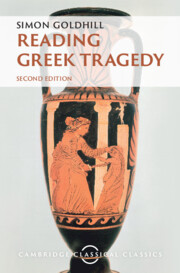Book contents
- Reading Greek Tragedy
- Cambridge Classical Classics
- Reading Greek Tragedy
- Copyright page
- Dedication
- Epigraph
- Contents
- Preface
- Preface to Second Printing
- Re-Reading Reading Greek Tragedy
- Chapter 1 The Drama of Logos
- Chapter 2 The Language of Appropriation
- Chapter 3 The City of Words
- Chapter 4 Relations and Relationships
- Chapter 5 Sexuality and Difference
- Chapter 6 Text and Tradition
- Chapter 7 Mind and Madness
- Chapter 8 Blindness and Insight
- Chapter 9 Sophistry, Philosophy, Rhetoric
- Chapter 10 Genre and Transgression
- Chapter 11 Performance and Performability
- Bibliography
- Index
Chapter 11 - Performance and Performability
Published online by Cambridge University Press: 19 October 2023
- Reading Greek Tragedy
- Cambridge Classical Classics
- Reading Greek Tragedy
- Copyright page
- Dedication
- Epigraph
- Contents
- Preface
- Preface to Second Printing
- Re-Reading Reading Greek Tragedy
- Chapter 1 The Drama of Logos
- Chapter 2 The Language of Appropriation
- Chapter 3 The City of Words
- Chapter 4 Relations and Relationships
- Chapter 5 Sexuality and Difference
- Chapter 6 Text and Tradition
- Chapter 7 Mind and Madness
- Chapter 8 Blindness and Insight
- Chapter 9 Sophistry, Philosophy, Rhetoric
- Chapter 10 Genre and Transgression
- Chapter 11 Performance and Performability
- Bibliography
- Index
Summary
The Bacchae is a particularly fitting work with which to end my study of Greek tragedy. Not only is it one of the latest extant plays – Euripides’ final masterpiece – but also the dense texture of image and theme in this extraordinary drama recalls so many of the ideas I have explored in the previous chapters. It is a text concerned with a man and a city and relations with the divine (embodied in the disguised Dionysus), and the work has often been read as a fundamentally religious statement, either in terms of a defence of Dionysus (justified divine vengeance); or an attack on the malicious element of destruction and disorder in Dionysiac or similar cult attitudes; or in terms of a recognition and demonstration of the necessary place of the irrational in man.1 As Foley has recently written, ‘the text undeniably raises questions about the nature of divinity and reflects the precariousness of social and political life in late fifth-century Athens’.2
- Type
- Chapter
- Information
- Reading Greek Tragedy , pp. 316 - 338Publisher: Cambridge University PressPrint publication year: 2023

